Case Study Report: Effective Management in Healthcare for Nursing
VerifiedAdded on 2021/04/21
|11
|3209
|30
Report
AI Summary
This report provides an in-depth analysis of effective management practices within the healthcare setting, focusing on a case study involving a 70-year-old patient with mental illness and asthma who experienced inadequate care. The report examines the need for effective management, reviews relevant literature on management theories and practices, and offers recommendations for improving clinical care and patient outcomes. It highlights the importance of proper resource management, including human resources, and the implementation of appropriate policies and procedures. The report emphasizes the application of scientific and modern management theories, such as transformational leadership, to enhance the quality of care, promote staff collaboration, and ensure ethical practices. Recommendations include implementing multi-disciplinary teams, prioritizing clinical quality improvement through data warehousing, and fostering personal effectiveness among healthcare professionals to ensure better patient outcomes. The report underscores the significance of effective leadership, collaboration, and the use of best practices to deliver high-quality, safe healthcare services.
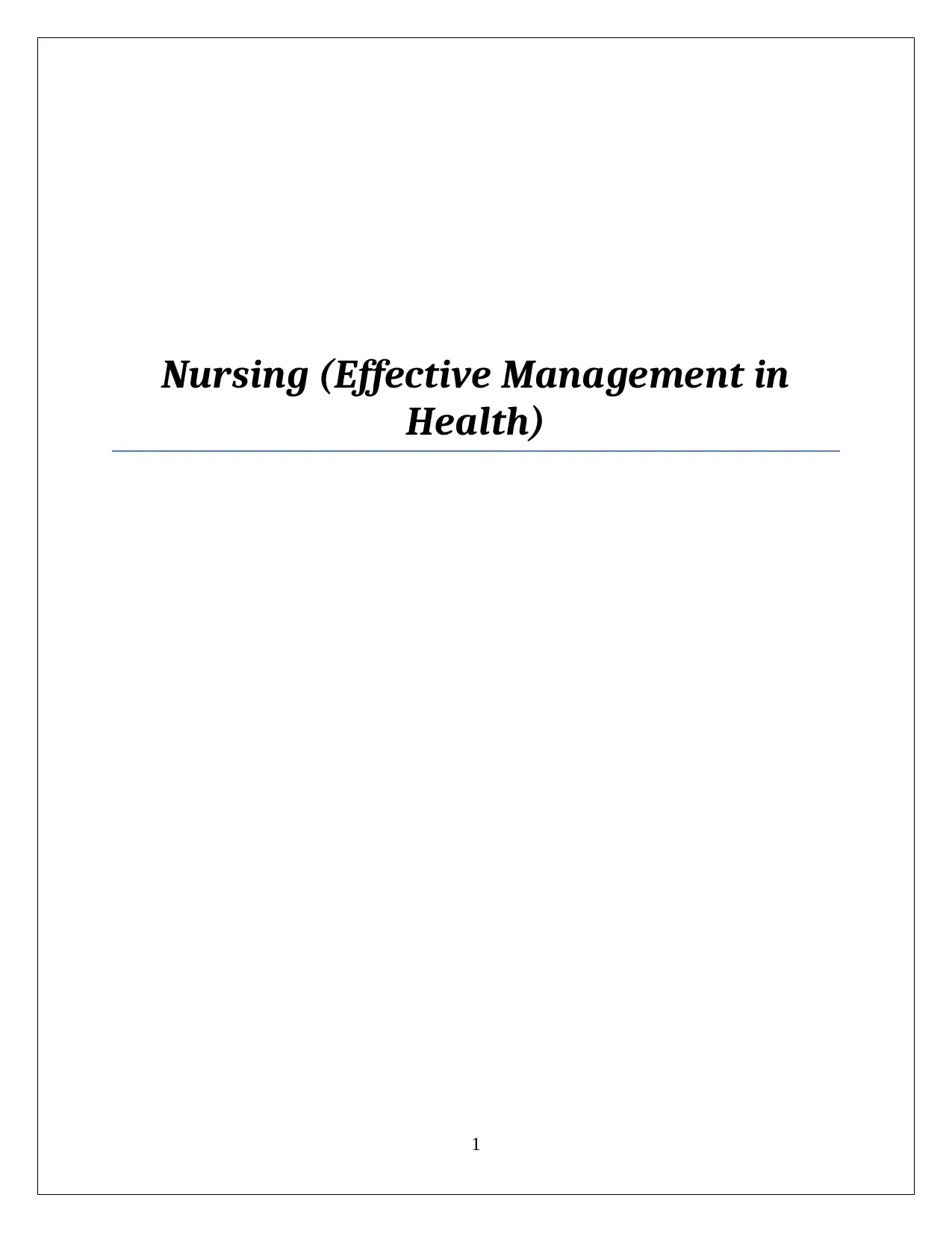
Nursing (Effective Management in
Health)
1
Health)
1
Paraphrase This Document
Need a fresh take? Get an instant paraphrase of this document with our AI Paraphraser
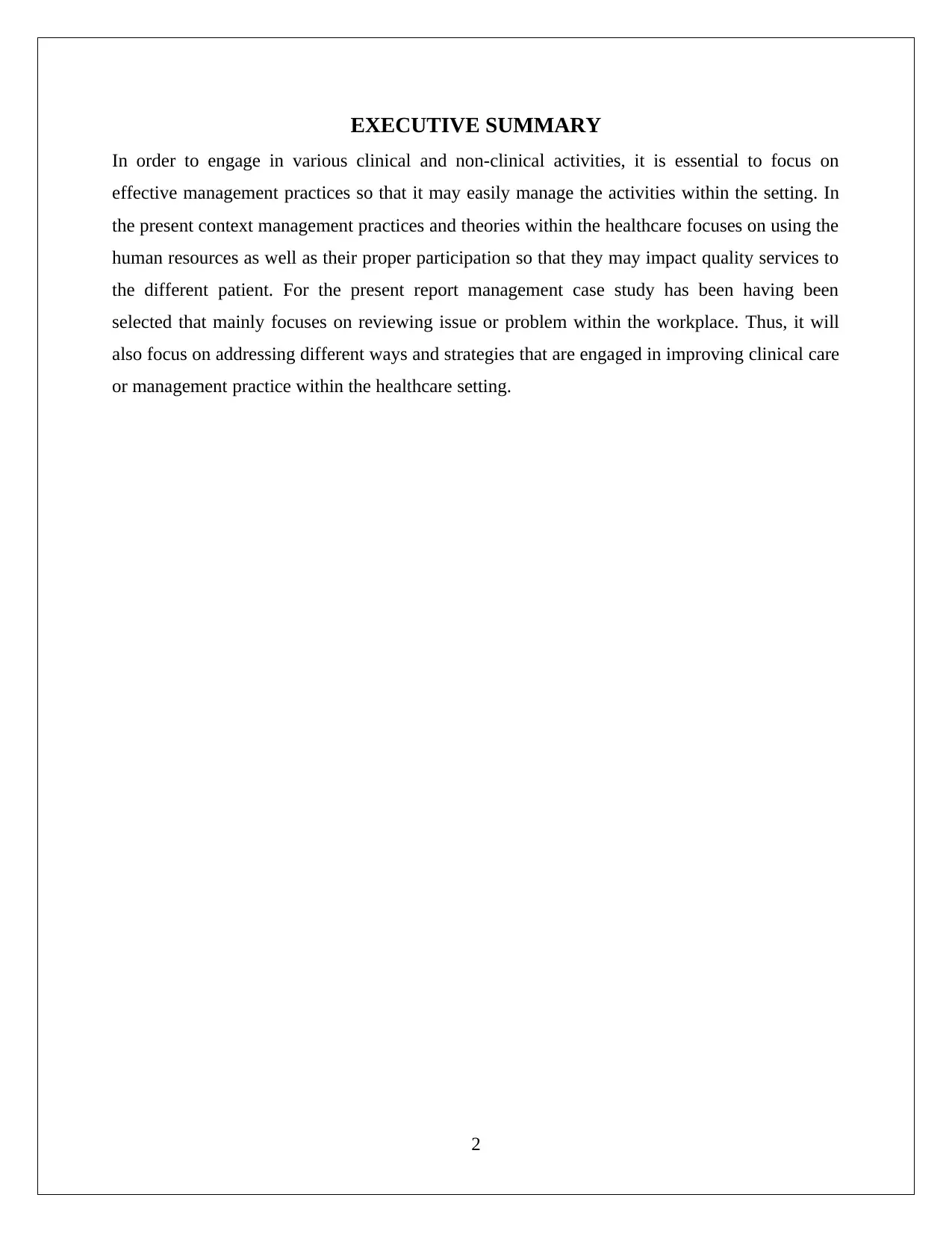
EXECUTIVE SUMMARY
In order to engage in various clinical and non-clinical activities, it is essential to focus on
effective management practices so that it may easily manage the activities within the setting. In
the present context management practices and theories within the healthcare focuses on using the
human resources as well as their proper participation so that they may impact quality services to
the different patient. For the present report management case study has been having been
selected that mainly focuses on reviewing issue or problem within the workplace. Thus, it will
also focus on addressing different ways and strategies that are engaged in improving clinical care
or management practice within the healthcare setting.
2
In order to engage in various clinical and non-clinical activities, it is essential to focus on
effective management practices so that it may easily manage the activities within the setting. In
the present context management practices and theories within the healthcare focuses on using the
human resources as well as their proper participation so that they may impact quality services to
the different patient. For the present report management case study has been having been
selected that mainly focuses on reviewing issue or problem within the workplace. Thus, it will
also focus on addressing different ways and strategies that are engaged in improving clinical care
or management practice within the healthcare setting.
2
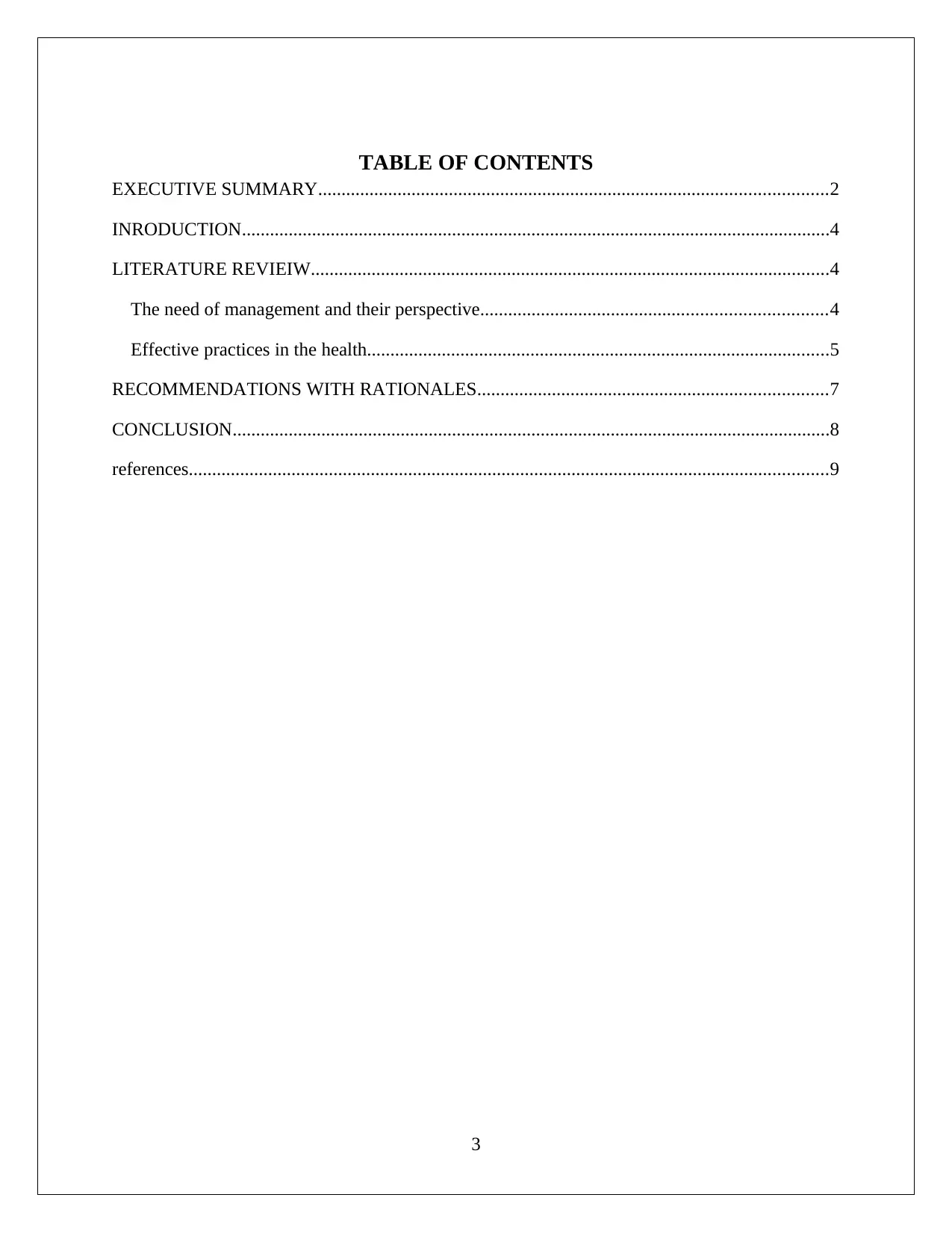
TABLE OF CONTENTS
EXECUTIVE SUMMARY.............................................................................................................2
INRODUCTION..............................................................................................................................4
LITERATURE REVIEIW...............................................................................................................4
The need of management and their perspective..........................................................................4
Effective practices in the health...................................................................................................5
RECOMMENDATIONS WITH RATIONALES...........................................................................7
CONCLUSION................................................................................................................................8
references.........................................................................................................................................9
3
EXECUTIVE SUMMARY.............................................................................................................2
INRODUCTION..............................................................................................................................4
LITERATURE REVIEIW...............................................................................................................4
The need of management and their perspective..........................................................................4
Effective practices in the health...................................................................................................5
RECOMMENDATIONS WITH RATIONALES...........................................................................7
CONCLUSION................................................................................................................................8
references.........................................................................................................................................9
3
⊘ This is a preview!⊘
Do you want full access?
Subscribe today to unlock all pages.

Trusted by 1+ million students worldwide
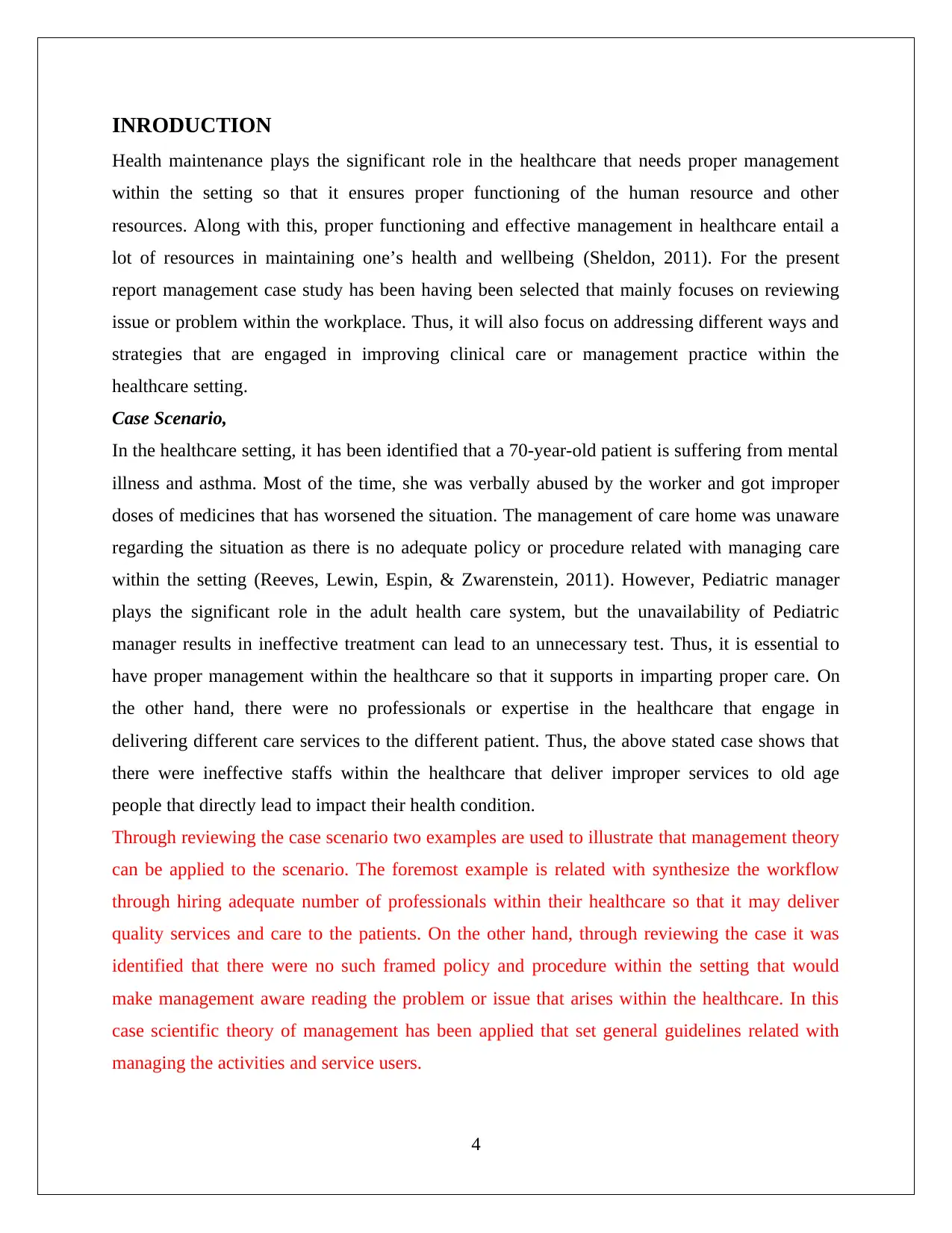
INRODUCTION
Health maintenance plays the significant role in the healthcare that needs proper management
within the setting so that it ensures proper functioning of the human resource and other
resources. Along with this, proper functioning and effective management in healthcare entail a
lot of resources in maintaining one’s health and wellbeing (Sheldon, 2011). For the present
report management case study has been having been selected that mainly focuses on reviewing
issue or problem within the workplace. Thus, it will also focus on addressing different ways and
strategies that are engaged in improving clinical care or management practice within the
healthcare setting.
Case Scenario,
In the healthcare setting, it has been identified that a 70-year-old patient is suffering from mental
illness and asthma. Most of the time, she was verbally abused by the worker and got improper
doses of medicines that has worsened the situation. The management of care home was unaware
regarding the situation as there is no adequate policy or procedure related with managing care
within the setting (Reeves, Lewin, Espin, & Zwarenstein, 2011). However, Pediatric manager
plays the significant role in the adult health care system, but the unavailability of Pediatric
manager results in ineffective treatment can lead to an unnecessary test. Thus, it is essential to
have proper management within the healthcare so that it supports in imparting proper care. On
the other hand, there were no professionals or expertise in the healthcare that engage in
delivering different care services to the different patient. Thus, the above stated case shows that
there were ineffective staffs within the healthcare that deliver improper services to old age
people that directly lead to impact their health condition.
Through reviewing the case scenario two examples are used to illustrate that management theory
can be applied to the scenario. The foremost example is related with synthesize the workflow
through hiring adequate number of professionals within their healthcare so that it may deliver
quality services and care to the patients. On the other hand, through reviewing the case it was
identified that there were no such framed policy and procedure within the setting that would
make management aware reading the problem or issue that arises within the healthcare. In this
case scientific theory of management has been applied that set general guidelines related with
managing the activities and service users.
4
Health maintenance plays the significant role in the healthcare that needs proper management
within the setting so that it ensures proper functioning of the human resource and other
resources. Along with this, proper functioning and effective management in healthcare entail a
lot of resources in maintaining one’s health and wellbeing (Sheldon, 2011). For the present
report management case study has been having been selected that mainly focuses on reviewing
issue or problem within the workplace. Thus, it will also focus on addressing different ways and
strategies that are engaged in improving clinical care or management practice within the
healthcare setting.
Case Scenario,
In the healthcare setting, it has been identified that a 70-year-old patient is suffering from mental
illness and asthma. Most of the time, she was verbally abused by the worker and got improper
doses of medicines that has worsened the situation. The management of care home was unaware
regarding the situation as there is no adequate policy or procedure related with managing care
within the setting (Reeves, Lewin, Espin, & Zwarenstein, 2011). However, Pediatric manager
plays the significant role in the adult health care system, but the unavailability of Pediatric
manager results in ineffective treatment can lead to an unnecessary test. Thus, it is essential to
have proper management within the healthcare so that it supports in imparting proper care. On
the other hand, there were no professionals or expertise in the healthcare that engage in
delivering different care services to the different patient. Thus, the above stated case shows that
there were ineffective staffs within the healthcare that deliver improper services to old age
people that directly lead to impact their health condition.
Through reviewing the case scenario two examples are used to illustrate that management theory
can be applied to the scenario. The foremost example is related with synthesize the workflow
through hiring adequate number of professionals within their healthcare so that it may deliver
quality services and care to the patients. On the other hand, through reviewing the case it was
identified that there were no such framed policy and procedure within the setting that would
make management aware reading the problem or issue that arises within the healthcare. In this
case scientific theory of management has been applied that set general guidelines related with
managing the activities and service users.
4
Paraphrase This Document
Need a fresh take? Get an instant paraphrase of this document with our AI Paraphraser
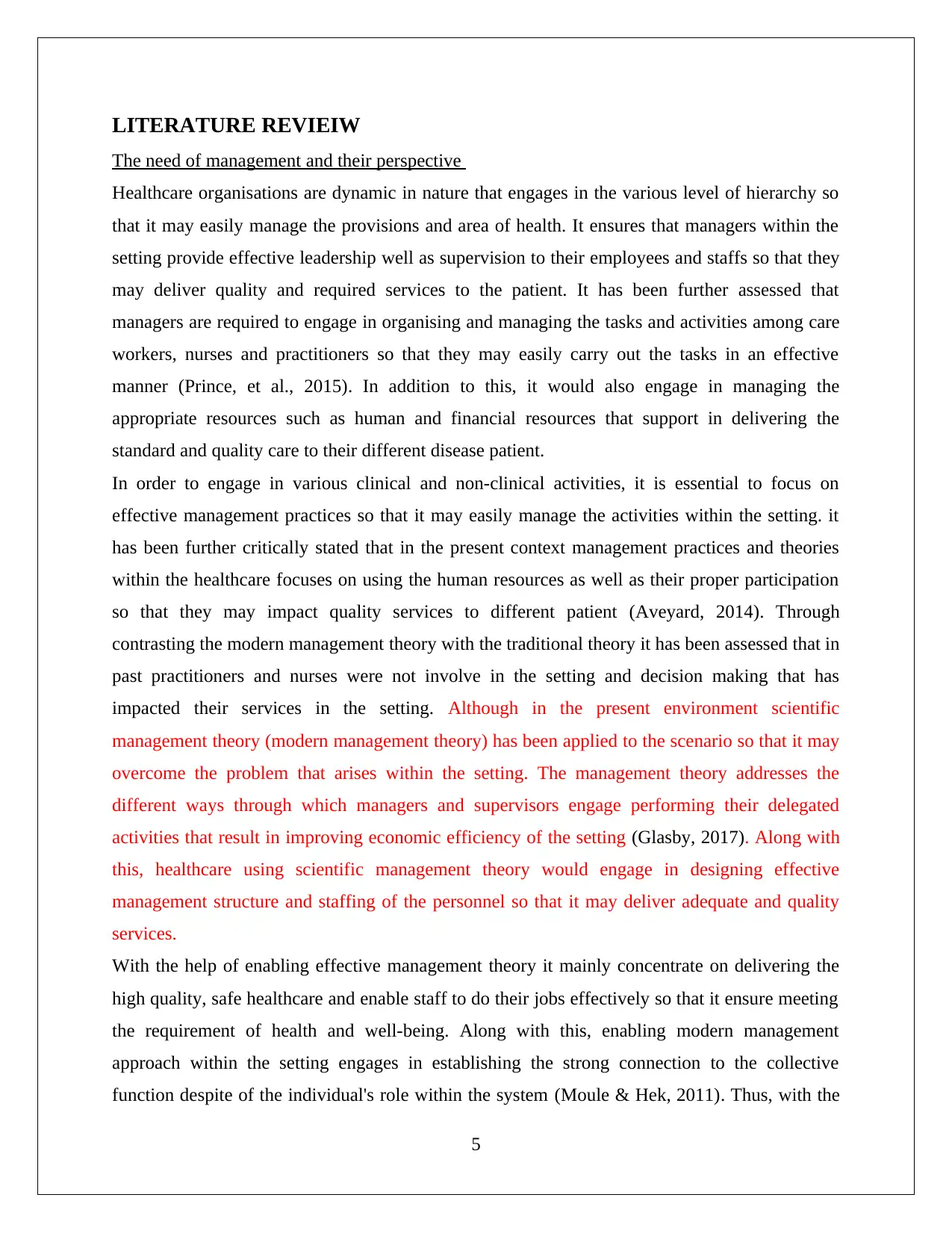
LITERATURE REVIEIW
The need of management and their perspective
Healthcare organisations are dynamic in nature that engages in the various level of hierarchy so
that it may easily manage the provisions and area of health. It ensures that managers within the
setting provide effective leadership well as supervision to their employees and staffs so that they
may deliver quality and required services to the patient. It has been further assessed that
managers are required to engage in organising and managing the tasks and activities among care
workers, nurses and practitioners so that they may easily carry out the tasks in an effective
manner (Prince, et al., 2015). In addition to this, it would also engage in managing the
appropriate resources such as human and financial resources that support in delivering the
standard and quality care to their different disease patient.
In order to engage in various clinical and non-clinical activities, it is essential to focus on
effective management practices so that it may easily manage the activities within the setting. it
has been further critically stated that in the present context management practices and theories
within the healthcare focuses on using the human resources as well as their proper participation
so that they may impact quality services to different patient (Aveyard, 2014). Through
contrasting the modern management theory with the traditional theory it has been assessed that in
past practitioners and nurses were not involve in the setting and decision making that has
impacted their services in the setting. Although in the present environment scientific
management theory (modern management theory) has been applied to the scenario so that it may
overcome the problem that arises within the setting. The management theory addresses the
different ways through which managers and supervisors engage performing their delegated
activities that result in improving economic efficiency of the setting (Glasby, 2017). Along with
this, healthcare using scientific management theory would engage in designing effective
management structure and staffing of the personnel so that it may deliver adequate and quality
services.
With the help of enabling effective management theory it mainly concentrate on delivering the
high quality, safe healthcare and enable staff to do their jobs effectively so that it ensure meeting
the requirement of health and well-being. Along with this, enabling modern management
approach within the setting engages in establishing the strong connection to the collective
function despite of the individual's role within the system (Moule & Hek, 2011). Thus, with the
5
The need of management and their perspective
Healthcare organisations are dynamic in nature that engages in the various level of hierarchy so
that it may easily manage the provisions and area of health. It ensures that managers within the
setting provide effective leadership well as supervision to their employees and staffs so that they
may deliver quality and required services to the patient. It has been further assessed that
managers are required to engage in organising and managing the tasks and activities among care
workers, nurses and practitioners so that they may easily carry out the tasks in an effective
manner (Prince, et al., 2015). In addition to this, it would also engage in managing the
appropriate resources such as human and financial resources that support in delivering the
standard and quality care to their different disease patient.
In order to engage in various clinical and non-clinical activities, it is essential to focus on
effective management practices so that it may easily manage the activities within the setting. it
has been further critically stated that in the present context management practices and theories
within the healthcare focuses on using the human resources as well as their proper participation
so that they may impact quality services to different patient (Aveyard, 2014). Through
contrasting the modern management theory with the traditional theory it has been assessed that in
past practitioners and nurses were not involve in the setting and decision making that has
impacted their services in the setting. Although in the present environment scientific
management theory (modern management theory) has been applied to the scenario so that it may
overcome the problem that arises within the setting. The management theory addresses the
different ways through which managers and supervisors engage performing their delegated
activities that result in improving economic efficiency of the setting (Glasby, 2017). Along with
this, healthcare using scientific management theory would engage in designing effective
management structure and staffing of the personnel so that it may deliver adequate and quality
services.
With the help of enabling effective management theory it mainly concentrate on delivering the
high quality, safe healthcare and enable staff to do their jobs effectively so that it ensure meeting
the requirement of health and well-being. Along with this, enabling modern management
approach within the setting engages in establishing the strong connection to the collective
function despite of the individual's role within the system (Moule & Hek, 2011). Thus, with the
5
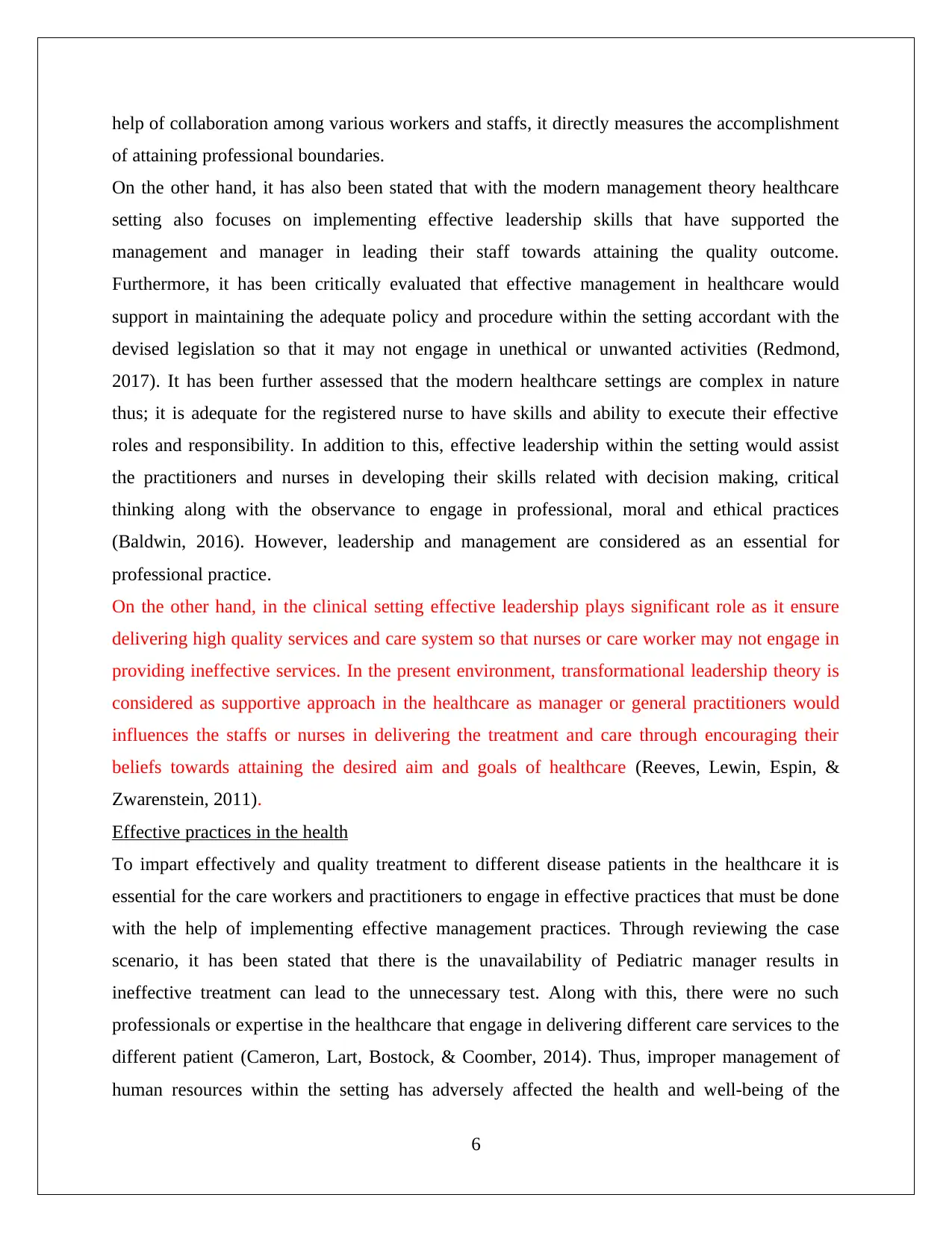
help of collaboration among various workers and staffs, it directly measures the accomplishment
of attaining professional boundaries.
On the other hand, it has also been stated that with the modern management theory healthcare
setting also focuses on implementing effective leadership skills that have supported the
management and manager in leading their staff towards attaining the quality outcome.
Furthermore, it has been critically evaluated that effective management in healthcare would
support in maintaining the adequate policy and procedure within the setting accordant with the
devised legislation so that it may not engage in unethical or unwanted activities (Redmond,
2017). It has been further assessed that the modern healthcare settings are complex in nature
thus; it is adequate for the registered nurse to have skills and ability to execute their effective
roles and responsibility. In addition to this, effective leadership within the setting would assist
the practitioners and nurses in developing their skills related with decision making, critical
thinking along with the observance to engage in professional, moral and ethical practices
(Baldwin, 2016). However, leadership and management are considered as an essential for
professional practice.
On the other hand, in the clinical setting effective leadership plays significant role as it ensure
delivering high quality services and care system so that nurses or care worker may not engage in
providing ineffective services. In the present environment, transformational leadership theory is
considered as supportive approach in the healthcare as manager or general practitioners would
influences the staffs or nurses in delivering the treatment and care through encouraging their
beliefs towards attaining the desired aim and goals of healthcare (Reeves, Lewin, Espin, &
Zwarenstein, 2011).
Effective practices in the health
To impart effectively and quality treatment to different disease patients in the healthcare it is
essential for the care workers and practitioners to engage in effective practices that must be done
with the help of implementing effective management practices. Through reviewing the case
scenario, it has been stated that there is the unavailability of Pediatric manager results in
ineffective treatment can lead to the unnecessary test. Along with this, there were no such
professionals or expertise in the healthcare that engage in delivering different care services to the
different patient (Cameron, Lart, Bostock, & Coomber, 2014). Thus, improper management of
human resources within the setting has adversely affected the health and well-being of the
6
of attaining professional boundaries.
On the other hand, it has also been stated that with the modern management theory healthcare
setting also focuses on implementing effective leadership skills that have supported the
management and manager in leading their staff towards attaining the quality outcome.
Furthermore, it has been critically evaluated that effective management in healthcare would
support in maintaining the adequate policy and procedure within the setting accordant with the
devised legislation so that it may not engage in unethical or unwanted activities (Redmond,
2017). It has been further assessed that the modern healthcare settings are complex in nature
thus; it is adequate for the registered nurse to have skills and ability to execute their effective
roles and responsibility. In addition to this, effective leadership within the setting would assist
the practitioners and nurses in developing their skills related with decision making, critical
thinking along with the observance to engage in professional, moral and ethical practices
(Baldwin, 2016). However, leadership and management are considered as an essential for
professional practice.
On the other hand, in the clinical setting effective leadership plays significant role as it ensure
delivering high quality services and care system so that nurses or care worker may not engage in
providing ineffective services. In the present environment, transformational leadership theory is
considered as supportive approach in the healthcare as manager or general practitioners would
influences the staffs or nurses in delivering the treatment and care through encouraging their
beliefs towards attaining the desired aim and goals of healthcare (Reeves, Lewin, Espin, &
Zwarenstein, 2011).
Effective practices in the health
To impart effectively and quality treatment to different disease patients in the healthcare it is
essential for the care workers and practitioners to engage in effective practices that must be done
with the help of implementing effective management practices. Through reviewing the case
scenario, it has been stated that there is the unavailability of Pediatric manager results in
ineffective treatment can lead to the unnecessary test. Along with this, there were no such
professionals or expertise in the healthcare that engage in delivering different care services to the
different patient (Cameron, Lart, Bostock, & Coomber, 2014). Thus, improper management of
human resources within the setting has adversely affected the health and well-being of the
6
⊘ This is a preview!⊘
Do you want full access?
Subscribe today to unlock all pages.

Trusted by 1+ million students worldwide
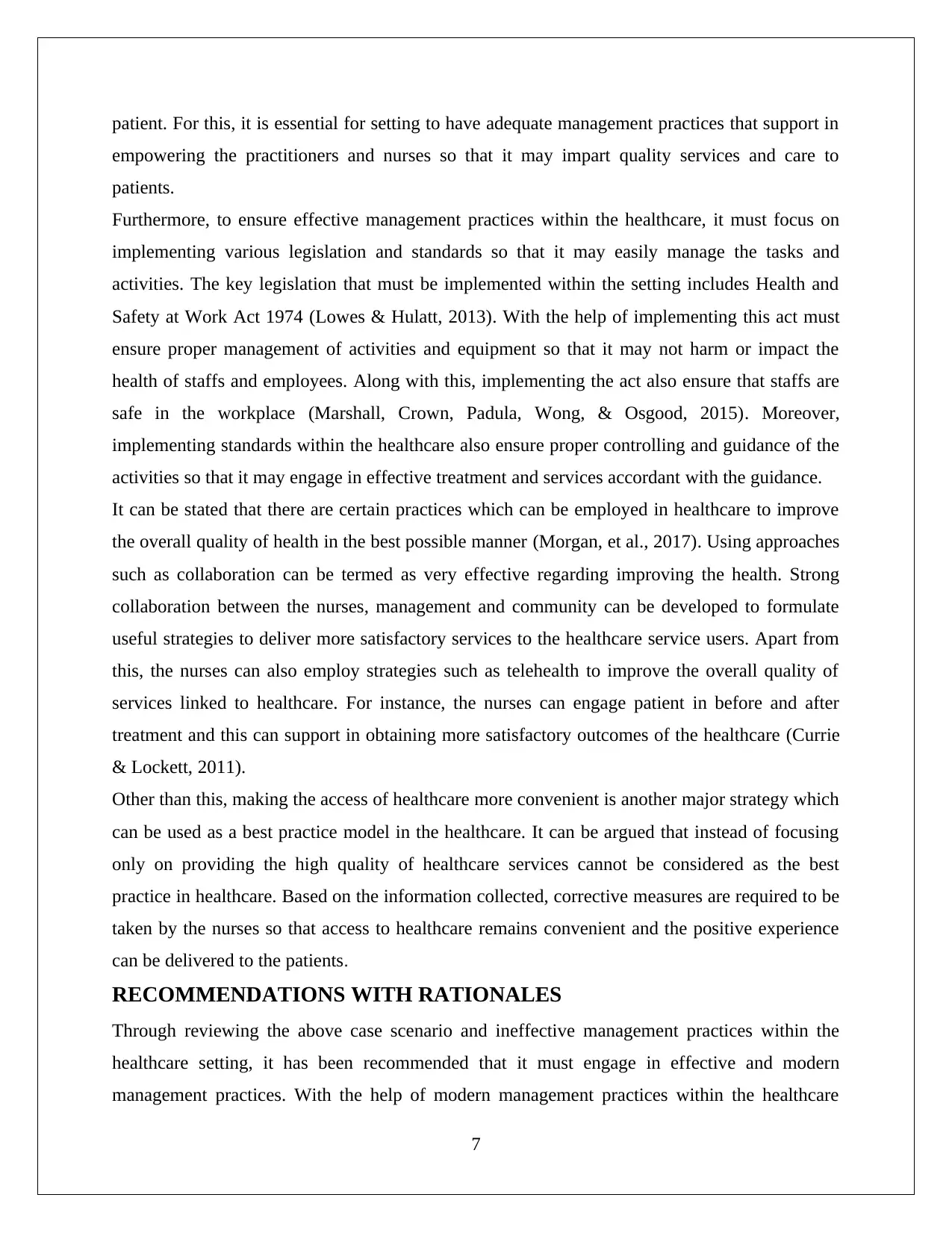
patient. For this, it is essential for setting to have adequate management practices that support in
empowering the practitioners and nurses so that it may impart quality services and care to
patients.
Furthermore, to ensure effective management practices within the healthcare, it must focus on
implementing various legislation and standards so that it may easily manage the tasks and
activities. The key legislation that must be implemented within the setting includes Health and
Safety at Work Act 1974 (Lowes & Hulatt, 2013). With the help of implementing this act must
ensure proper management of activities and equipment so that it may not harm or impact the
health of staffs and employees. Along with this, implementing the act also ensure that staffs are
safe in the workplace (Marshall, Crown, Padula, Wong, & Osgood, 2015). Moreover,
implementing standards within the healthcare also ensure proper controlling and guidance of the
activities so that it may engage in effective treatment and services accordant with the guidance.
It can be stated that there are certain practices which can be employed in healthcare to improve
the overall quality of health in the best possible manner (Morgan, et al., 2017). Using approaches
such as collaboration can be termed as very effective regarding improving the health. Strong
collaboration between the nurses, management and community can be developed to formulate
useful strategies to deliver more satisfactory services to the healthcare service users. Apart from
this, the nurses can also employ strategies such as telehealth to improve the overall quality of
services linked to healthcare. For instance, the nurses can engage patient in before and after
treatment and this can support in obtaining more satisfactory outcomes of the healthcare (Currie
& Lockett, 2011).
Other than this, making the access of healthcare more convenient is another major strategy which
can be used as a best practice model in the healthcare. It can be argued that instead of focusing
only on providing the high quality of healthcare services cannot be considered as the best
practice in healthcare. Based on the information collected, corrective measures are required to be
taken by the nurses so that access to healthcare remains convenient and the positive experience
can be delivered to the patients.
RECOMMENDATIONS WITH RATIONALES
Through reviewing the above case scenario and ineffective management practices within the
healthcare setting, it has been recommended that it must engage in effective and modern
management practices. With the help of modern management practices within the healthcare
7
empowering the practitioners and nurses so that it may impart quality services and care to
patients.
Furthermore, to ensure effective management practices within the healthcare, it must focus on
implementing various legislation and standards so that it may easily manage the tasks and
activities. The key legislation that must be implemented within the setting includes Health and
Safety at Work Act 1974 (Lowes & Hulatt, 2013). With the help of implementing this act must
ensure proper management of activities and equipment so that it may not harm or impact the
health of staffs and employees. Along with this, implementing the act also ensure that staffs are
safe in the workplace (Marshall, Crown, Padula, Wong, & Osgood, 2015). Moreover,
implementing standards within the healthcare also ensure proper controlling and guidance of the
activities so that it may engage in effective treatment and services accordant with the guidance.
It can be stated that there are certain practices which can be employed in healthcare to improve
the overall quality of health in the best possible manner (Morgan, et al., 2017). Using approaches
such as collaboration can be termed as very effective regarding improving the health. Strong
collaboration between the nurses, management and community can be developed to formulate
useful strategies to deliver more satisfactory services to the healthcare service users. Apart from
this, the nurses can also employ strategies such as telehealth to improve the overall quality of
services linked to healthcare. For instance, the nurses can engage patient in before and after
treatment and this can support in obtaining more satisfactory outcomes of the healthcare (Currie
& Lockett, 2011).
Other than this, making the access of healthcare more convenient is another major strategy which
can be used as a best practice model in the healthcare. It can be argued that instead of focusing
only on providing the high quality of healthcare services cannot be considered as the best
practice in healthcare. Based on the information collected, corrective measures are required to be
taken by the nurses so that access to healthcare remains convenient and the positive experience
can be delivered to the patients.
RECOMMENDATIONS WITH RATIONALES
Through reviewing the above case scenario and ineffective management practices within the
healthcare setting, it has been recommended that it must engage in effective and modern
management practices. With the help of modern management practices within the healthcare
7
Paraphrase This Document
Need a fresh take? Get an instant paraphrase of this document with our AI Paraphraser
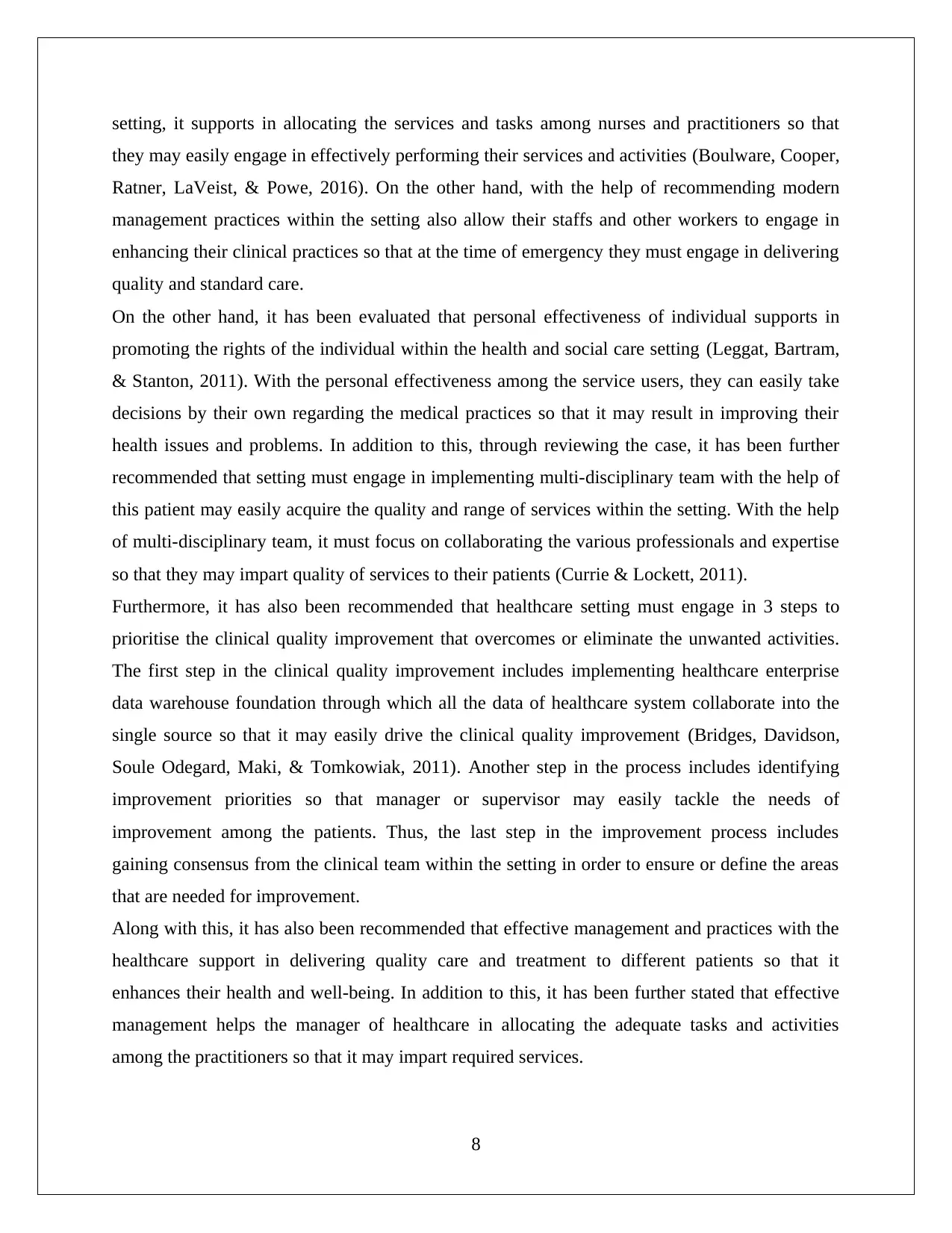
setting, it supports in allocating the services and tasks among nurses and practitioners so that
they may easily engage in effectively performing their services and activities (Boulware, Cooper,
Ratner, LaVeist, & Powe, 2016). On the other hand, with the help of recommending modern
management practices within the setting also allow their staffs and other workers to engage in
enhancing their clinical practices so that at the time of emergency they must engage in delivering
quality and standard care.
On the other hand, it has been evaluated that personal effectiveness of individual supports in
promoting the rights of the individual within the health and social care setting (Leggat, Bartram,
& Stanton, 2011). With the personal effectiveness among the service users, they can easily take
decisions by their own regarding the medical practices so that it may result in improving their
health issues and problems. In addition to this, through reviewing the case, it has been further
recommended that setting must engage in implementing multi-disciplinary team with the help of
this patient may easily acquire the quality and range of services within the setting. With the help
of multi-disciplinary team, it must focus on collaborating the various professionals and expertise
so that they may impart quality of services to their patients (Currie & Lockett, 2011).
Furthermore, it has also been recommended that healthcare setting must engage in 3 steps to
prioritise the clinical quality improvement that overcomes or eliminate the unwanted activities.
The first step in the clinical quality improvement includes implementing healthcare enterprise
data warehouse foundation through which all the data of healthcare system collaborate into the
single source so that it may easily drive the clinical quality improvement (Bridges, Davidson,
Soule Odegard, Maki, & Tomkowiak, 2011). Another step in the process includes identifying
improvement priorities so that manager or supervisor may easily tackle the needs of
improvement among the patients. Thus, the last step in the improvement process includes
gaining consensus from the clinical team within the setting in order to ensure or define the areas
that are needed for improvement.
Along with this, it has also been recommended that effective management and practices with the
healthcare support in delivering quality care and treatment to different patients so that it
enhances their health and well-being. In addition to this, it has been further stated that effective
management helps the manager of healthcare in allocating the adequate tasks and activities
among the practitioners so that it may impart required services.
8
they may easily engage in effectively performing their services and activities (Boulware, Cooper,
Ratner, LaVeist, & Powe, 2016). On the other hand, with the help of recommending modern
management practices within the setting also allow their staffs and other workers to engage in
enhancing their clinical practices so that at the time of emergency they must engage in delivering
quality and standard care.
On the other hand, it has been evaluated that personal effectiveness of individual supports in
promoting the rights of the individual within the health and social care setting (Leggat, Bartram,
& Stanton, 2011). With the personal effectiveness among the service users, they can easily take
decisions by their own regarding the medical practices so that it may result in improving their
health issues and problems. In addition to this, through reviewing the case, it has been further
recommended that setting must engage in implementing multi-disciplinary team with the help of
this patient may easily acquire the quality and range of services within the setting. With the help
of multi-disciplinary team, it must focus on collaborating the various professionals and expertise
so that they may impart quality of services to their patients (Currie & Lockett, 2011).
Furthermore, it has also been recommended that healthcare setting must engage in 3 steps to
prioritise the clinical quality improvement that overcomes or eliminate the unwanted activities.
The first step in the clinical quality improvement includes implementing healthcare enterprise
data warehouse foundation through which all the data of healthcare system collaborate into the
single source so that it may easily drive the clinical quality improvement (Bridges, Davidson,
Soule Odegard, Maki, & Tomkowiak, 2011). Another step in the process includes identifying
improvement priorities so that manager or supervisor may easily tackle the needs of
improvement among the patients. Thus, the last step in the improvement process includes
gaining consensus from the clinical team within the setting in order to ensure or define the areas
that are needed for improvement.
Along with this, it has also been recommended that effective management and practices with the
healthcare support in delivering quality care and treatment to different patients so that it
enhances their health and well-being. In addition to this, it has been further stated that effective
management helps the manager of healthcare in allocating the adequate tasks and activities
among the practitioners so that it may impart required services.
8
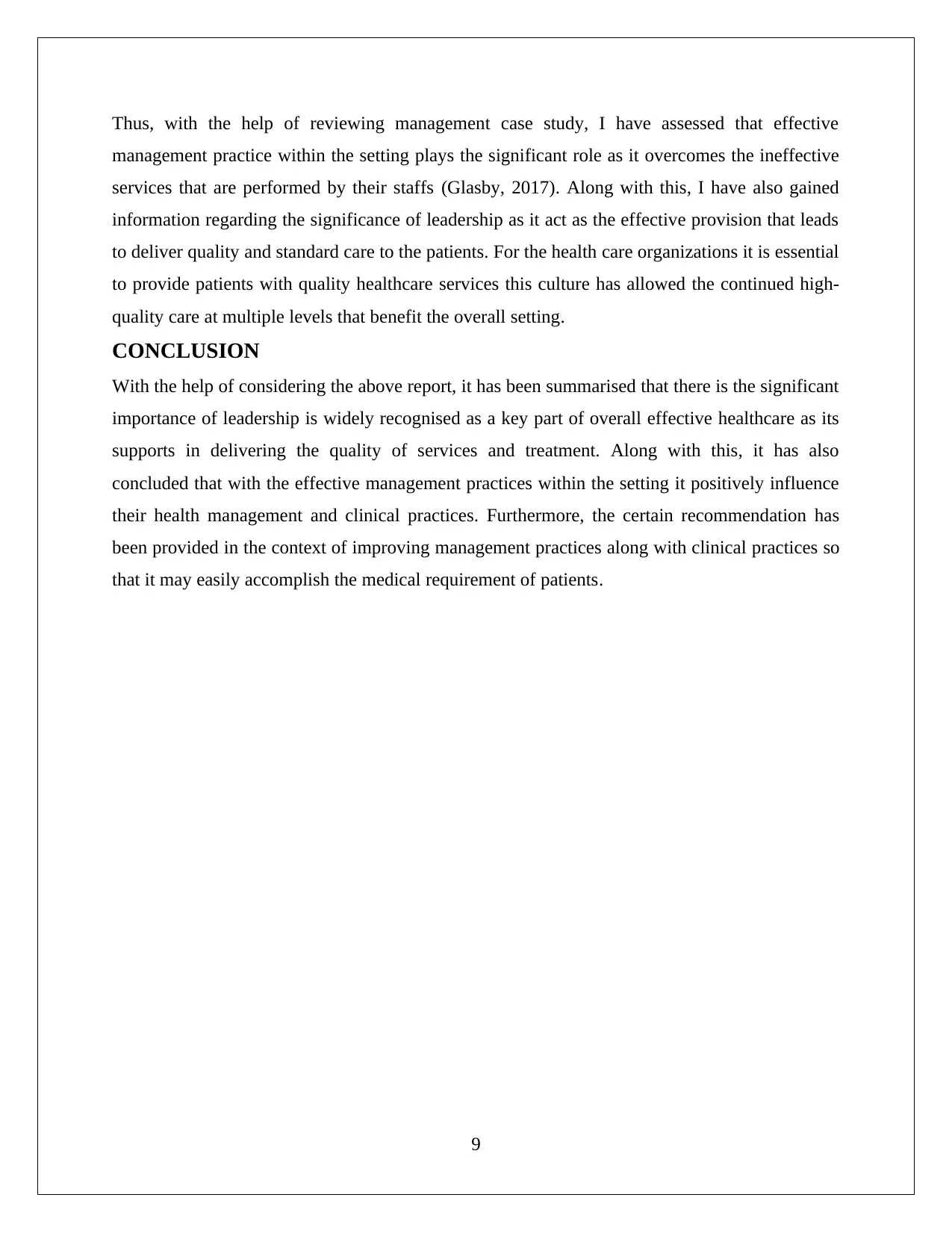
Thus, with the help of reviewing management case study, I have assessed that effective
management practice within the setting plays the significant role as it overcomes the ineffective
services that are performed by their staffs (Glasby, 2017). Along with this, I have also gained
information regarding the significance of leadership as it act as the effective provision that leads
to deliver quality and standard care to the patients. For the health care organizations it is essential
to provide patients with quality healthcare services this culture has allowed the continued high-
quality care at multiple levels that benefit the overall setting.
CONCLUSION
With the help of considering the above report, it has been summarised that there is the significant
importance of leadership is widely recognised as a key part of overall effective healthcare as its
supports in delivering the quality of services and treatment. Along with this, it has also
concluded that with the effective management practices within the setting it positively influence
their health management and clinical practices. Furthermore, the certain recommendation has
been provided in the context of improving management practices along with clinical practices so
that it may easily accomplish the medical requirement of patients.
9
management practice within the setting plays the significant role as it overcomes the ineffective
services that are performed by their staffs (Glasby, 2017). Along with this, I have also gained
information regarding the significance of leadership as it act as the effective provision that leads
to deliver quality and standard care to the patients. For the health care organizations it is essential
to provide patients with quality healthcare services this culture has allowed the continued high-
quality care at multiple levels that benefit the overall setting.
CONCLUSION
With the help of considering the above report, it has been summarised that there is the significant
importance of leadership is widely recognised as a key part of overall effective healthcare as its
supports in delivering the quality of services and treatment. Along with this, it has also
concluded that with the effective management practices within the setting it positively influence
their health management and clinical practices. Furthermore, the certain recommendation has
been provided in the context of improving management practices along with clinical practices so
that it may easily accomplish the medical requirement of patients.
9
⊘ This is a preview!⊘
Do you want full access?
Subscribe today to unlock all pages.

Trusted by 1+ million students worldwide
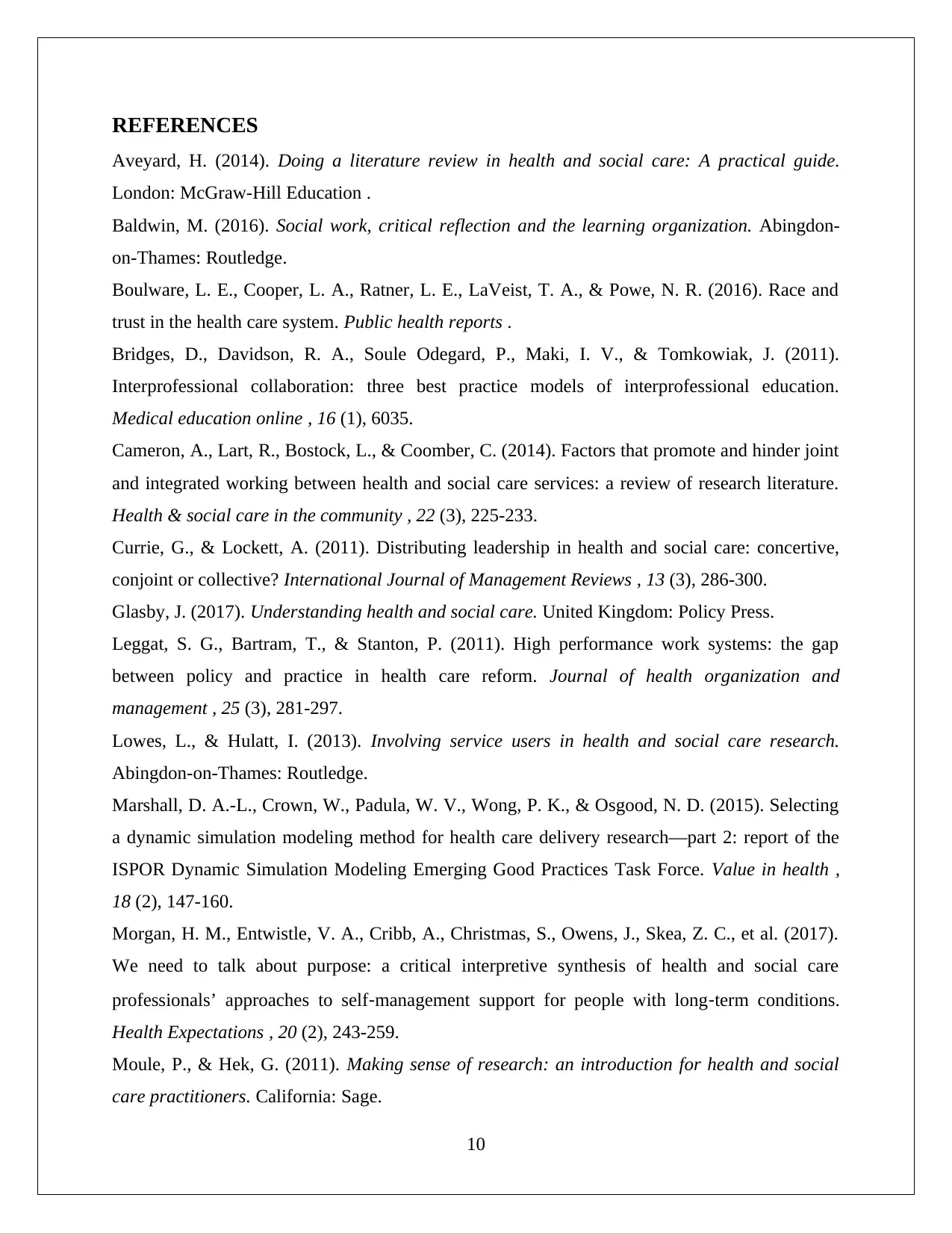
REFERENCES
Aveyard, H. (2014). Doing a literature review in health and social care: A practical guide.
London: McGraw-Hill Education .
Baldwin, M. (2016). Social work, critical reflection and the learning organization. Abingdon-
on-Thames: Routledge.
Boulware, L. E., Cooper, L. A., Ratner, L. E., LaVeist, T. A., & Powe, N. R. (2016). Race and
trust in the health care system. Public health reports .
Bridges, D., Davidson, R. A., Soule Odegard, P., Maki, I. V., & Tomkowiak, J. (2011).
Interprofessional collaboration: three best practice models of interprofessional education.
Medical education online , 16 (1), 6035.
Cameron, A., Lart, R., Bostock, L., & Coomber, C. (2014). Factors that promote and hinder joint
and integrated working between health and social care services: a review of research literature.
Health & social care in the community , 22 (3), 225-233.
Currie, G., & Lockett, A. (2011). Distributing leadership in health and social care: concertive,
conjoint or collective? International Journal of Management Reviews , 13 (3), 286-300.
Glasby, J. (2017). Understanding health and social care. United Kingdom: Policy Press.
Leggat, S. G., Bartram, T., & Stanton, P. (2011). High performance work systems: the gap
between policy and practice in health care reform. Journal of health organization and
management , 25 (3), 281-297.
Lowes, L., & Hulatt, I. (2013). Involving service users in health and social care research.
Abingdon-on-Thames: Routledge.
Marshall, D. A.-L., Crown, W., Padula, W. V., Wong, P. K., & Osgood, N. D. (2015). Selecting
a dynamic simulation modeling method for health care delivery research—part 2: report of the
ISPOR Dynamic Simulation Modeling Emerging Good Practices Task Force. Value in health ,
18 (2), 147-160.
Morgan, H. M., Entwistle, V. A., Cribb, A., Christmas, S., Owens, J., Skea, Z. C., et al. (2017).
We need to talk about purpose: a critical interpretive synthesis of health and social care
professionals’ approaches to self‐management support for people with long‐term conditions.
Health Expectations , 20 (2), 243-259.
Moule, P., & Hek, G. (2011). Making sense of research: an introduction for health and social
care practitioners. California: Sage.
10
Aveyard, H. (2014). Doing a literature review in health and social care: A practical guide.
London: McGraw-Hill Education .
Baldwin, M. (2016). Social work, critical reflection and the learning organization. Abingdon-
on-Thames: Routledge.
Boulware, L. E., Cooper, L. A., Ratner, L. E., LaVeist, T. A., & Powe, N. R. (2016). Race and
trust in the health care system. Public health reports .
Bridges, D., Davidson, R. A., Soule Odegard, P., Maki, I. V., & Tomkowiak, J. (2011).
Interprofessional collaboration: three best practice models of interprofessional education.
Medical education online , 16 (1), 6035.
Cameron, A., Lart, R., Bostock, L., & Coomber, C. (2014). Factors that promote and hinder joint
and integrated working between health and social care services: a review of research literature.
Health & social care in the community , 22 (3), 225-233.
Currie, G., & Lockett, A. (2011). Distributing leadership in health and social care: concertive,
conjoint or collective? International Journal of Management Reviews , 13 (3), 286-300.
Glasby, J. (2017). Understanding health and social care. United Kingdom: Policy Press.
Leggat, S. G., Bartram, T., & Stanton, P. (2011). High performance work systems: the gap
between policy and practice in health care reform. Journal of health organization and
management , 25 (3), 281-297.
Lowes, L., & Hulatt, I. (2013). Involving service users in health and social care research.
Abingdon-on-Thames: Routledge.
Marshall, D. A.-L., Crown, W., Padula, W. V., Wong, P. K., & Osgood, N. D. (2015). Selecting
a dynamic simulation modeling method for health care delivery research—part 2: report of the
ISPOR Dynamic Simulation Modeling Emerging Good Practices Task Force. Value in health ,
18 (2), 147-160.
Morgan, H. M., Entwistle, V. A., Cribb, A., Christmas, S., Owens, J., Skea, Z. C., et al. (2017).
We need to talk about purpose: a critical interpretive synthesis of health and social care
professionals’ approaches to self‐management support for people with long‐term conditions.
Health Expectations , 20 (2), 243-259.
Moule, P., & Hek, G. (2011). Making sense of research: an introduction for health and social
care practitioners. California: Sage.
10
Paraphrase This Document
Need a fresh take? Get an instant paraphrase of this document with our AI Paraphraser
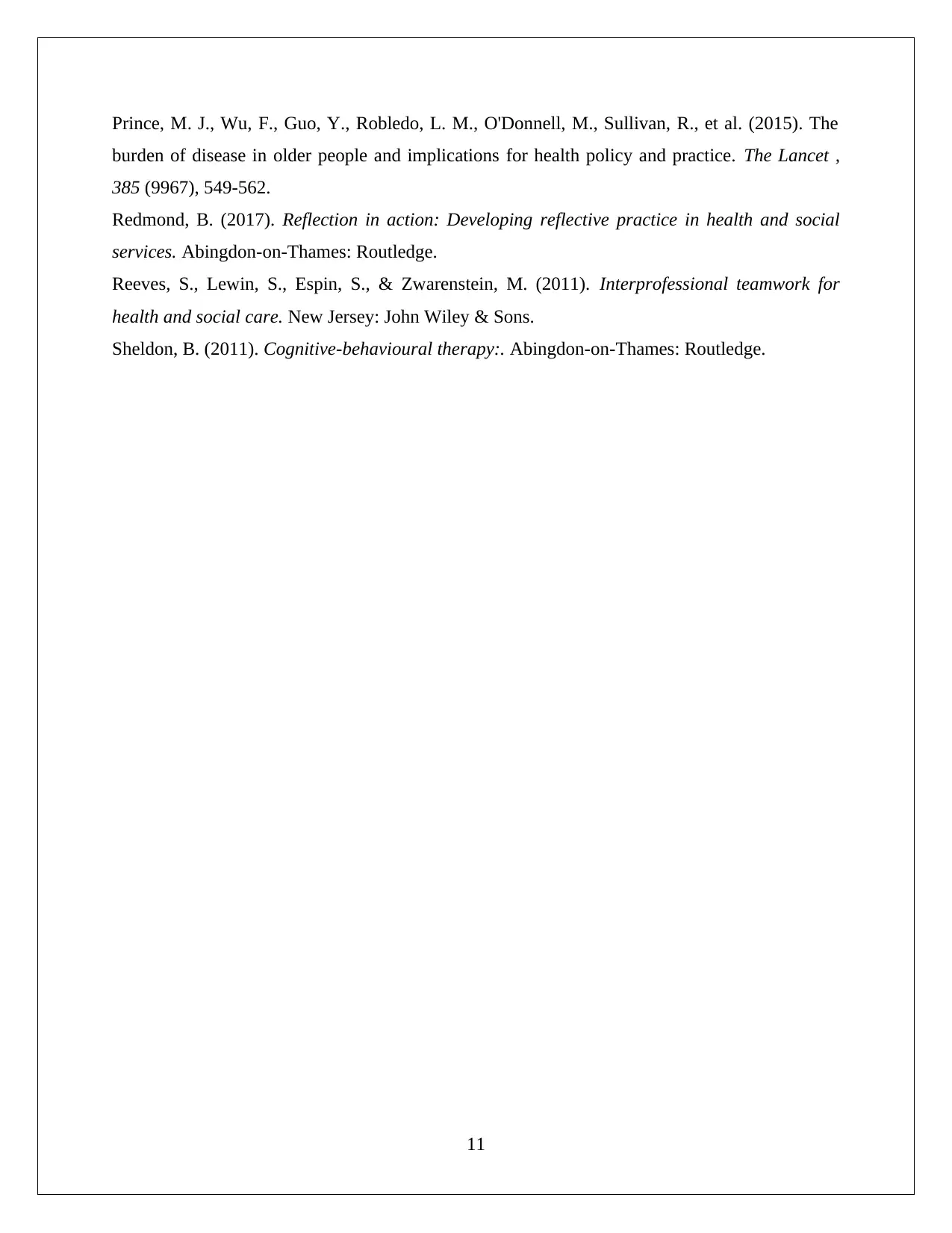
Prince, M. J., Wu, F., Guo, Y., Robledo, L. M., O'Donnell, M., Sullivan, R., et al. (2015). The
burden of disease in older people and implications for health policy and practice. The Lancet ,
385 (9967), 549-562.
Redmond, B. (2017). Reflection in action: Developing reflective practice in health and social
services. Abingdon-on-Thames: Routledge.
Reeves, S., Lewin, S., Espin, S., & Zwarenstein, M. (2011). Interprofessional teamwork for
health and social care. New Jersey: John Wiley & Sons.
Sheldon, B. (2011). Cognitive-behavioural therapy:. Abingdon-on-Thames: Routledge.
11
burden of disease in older people and implications for health policy and practice. The Lancet ,
385 (9967), 549-562.
Redmond, B. (2017). Reflection in action: Developing reflective practice in health and social
services. Abingdon-on-Thames: Routledge.
Reeves, S., Lewin, S., Espin, S., & Zwarenstein, M. (2011). Interprofessional teamwork for
health and social care. New Jersey: John Wiley & Sons.
Sheldon, B. (2011). Cognitive-behavioural therapy:. Abingdon-on-Thames: Routledge.
11
1 out of 11
Related Documents
Your All-in-One AI-Powered Toolkit for Academic Success.
+13062052269
info@desklib.com
Available 24*7 on WhatsApp / Email
![[object Object]](/_next/static/media/star-bottom.7253800d.svg)
Unlock your academic potential
Copyright © 2020–2026 A2Z Services. All Rights Reserved. Developed and managed by ZUCOL.





